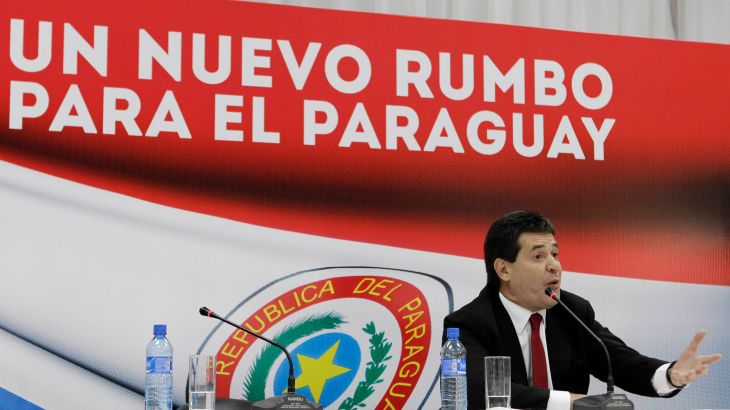
Paraguay: A victory for corruption?
We examine the impact of Horacio Cartes’ victory in Paraguay’s elections on the country as well as on Latin America.
|
“This is … a really horrible outcome; the Colorado Party supported Alfredo Stroesner dictatorship, which engaged in a persecution of non-violent protesters, supported Nazi war criminal, drug smuggling, persecution of indigenous peoples …. I hope that maybe this will prompt a sober reassessment on the part of the Paraguayan left, and maybe the wider South American left … ” – Nikolas Kozloff, the author of Revolution! South America and the Rise of the New Left |
Horacio Cartes’s victory in Paraguay’s presidential elections marks a return to power for the Colorado Party which ruled the country for 61 years until 2008.
He will fill a post left vacant after President Fernando Lugo’s impeachment last year.
Many on the left have argued Lugo’s ousting amounted to a coup, after his reform programme was blocked by opposition from landowning elites and agribusiness interests.
Cartes won out over his main challenger, Efrain Alegre whose centre-right Liberal party took power following Lugo’s removal.
Cartes is a tobacco magnate and one of the country’s richest men, owning banks, a sports team and soybean farms.
In the past he has been arrested over allegations of currency fraud, investigated for alleged tax evasion and accused of drug trafficking by the US.
He owns more than 20 companies, which include a bank, agricultural estates, tobacco plantations and a soft drink bottler.
|
“The Colorado Party runs itself very much the way it has in the sense of the late 19th century … although this is a very negative outcome … this is not at all surprising … the real surprise in Paraguay was in 2008 the election of someone who was not Colorado, but no one really expected even at that time, that that was likely to hold, so this is very much business as usual both for the party and for the electorate in general.” -Kregg Hetherington, the author of Guerilla Auditors, Transparency, Democracy and Rural politics in post-Cold War Paraguay |
Cartes and his Colorado Party are backed by wealthy landowners and agricultural businesses. His supporters say his connections will help create new employment opportunities and bring foreign investment.
The leader was jailed for nearly a year in 1989 for illegal currency dealings, but was later acquitted.
In 2000, Paraguayan police seized a plane loaded with marijuana and cocaine that had landed on one of his farms. But Cartes denies any ties to drug traffickers and says the plane had made an emergency landing.
So what does Horacio Cartes’ victory means for Paraguay and what kind of a leader will he be?
Inside Story Americas , with presenter Shihab Rattansi, discusses with guests: Adrienne Pine, professor of anthropology at American University and specialises in Latin America; Kregg Hetherington, author of Guerilla Auditors, Transparency, Democracy and Rural politics in post-Cold War Paraguay and teaches at Concordia University; and Nikolas Kozloff author of Revolution! South America and the Rise of the New Left.
|
“This is somebody who the DEA has investigated for drug trafficking, who set up a bank with no actual building, and no employees on the Cook islands, which was basically for laundering money in the 90s and [it] follows a pattern of wealthy land owners and businessmean in Latin America, who have come to power, and who have received the support of the United States … ” – Adrienne Pine, an anthropology professor |